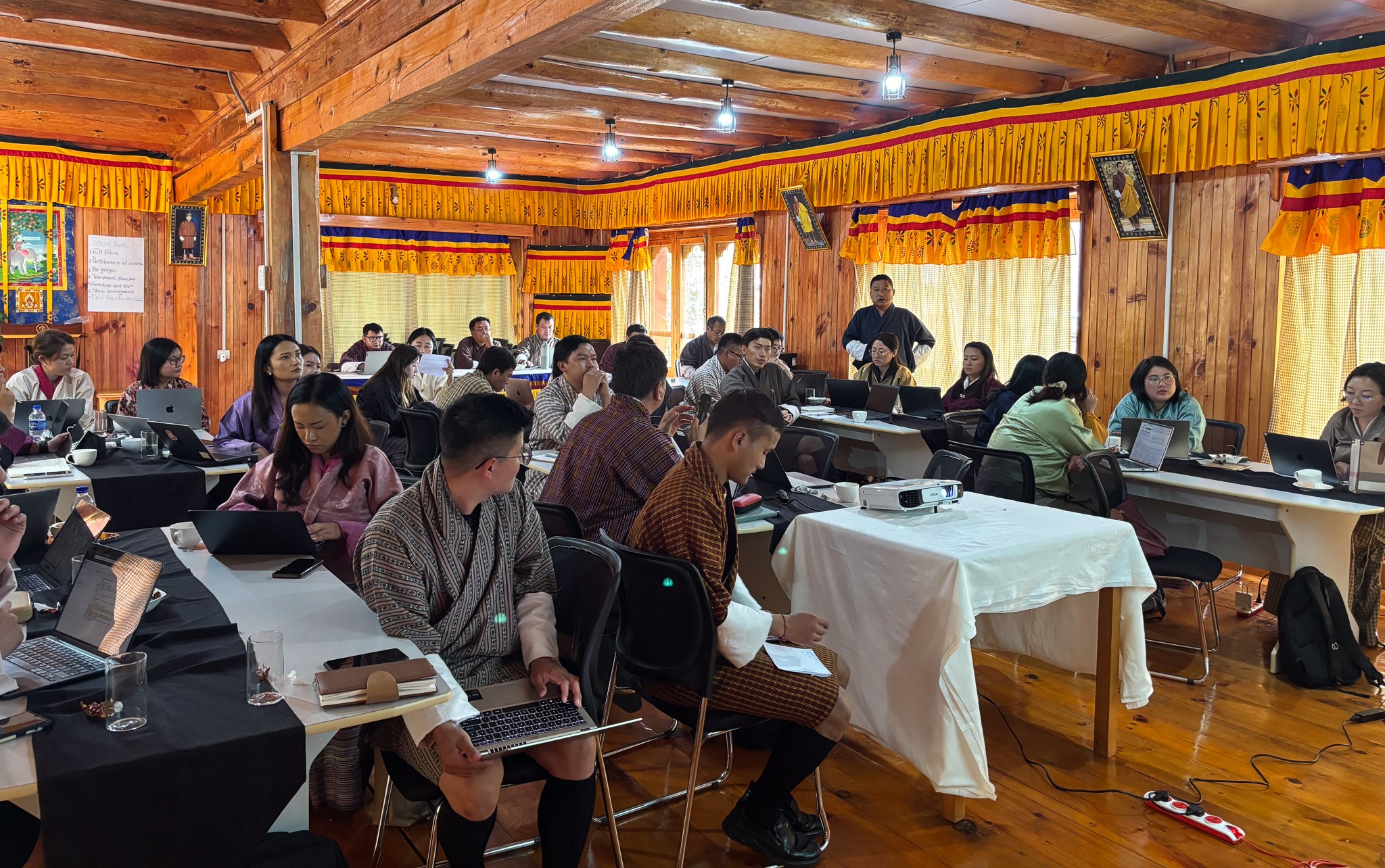
Bhutan advances fiscal foresight by validating its second Biodiversity and Climate Expenditure Review to strengthen investment tracking and resilience.
In the rapidly changing climate and fiscal landscape, biodiversity loss and climate change are no longer issues confined to environmental sectors but are emerging into macroeconomic and fiscal risks impacting economic stability. In Bhutan, where rich ecosystems and ecological diversity forms the backbone of livelihoods, resilience, and national identity, pre-empting and managing these risks have never been more urgent. To respond, the Ministry of Finance has validated its second Biodiversity and Climate Expenditure Review (BCER) under the UNDP Biodiversity Finance Initiative (BIOFIN) programme.
Bhutan’s rich biodiversity, including the endangered red panda, highlights the importance of tracking investments in nature to safeguard ecosystems and livelihoods.
The BCER helps governments identify where public investments in biodiversity and climate are flowing, and where critical gaps remain. Unlike project-level reporting, it applies a whole-of-government approach, capturing spending in less conventional sectors such as agriculture, water, and disaster risk reduction. By clarifying where money goes and where inefficiencies exist, the BCER enables a shift from reactive to proactive public spending, which helps avoid future costs associated with recovery from climate disasters or food insecurity.
Linking Finance and Nature
Tracking biodiversity and climate expenditure within national financial systems strengthens Bhutan’s ability to meet both domestic and international commitments, including the Kunming-Montreal Global Biodiversity Framework (KMGBF), the National Biodiversity Strategic Action Plan (NBSAP), and reporting obligations under the Convention on Biological Diversity (CBD) and the Paris Agreement.
For Bhutan, where resources are limited and aid flows are shrinking, such evidence-based financial planning is essential. It allows institutions to mobilise and use biodiversity finance more effectively, while also strengthening national planning and accountability.
The Validation Workshop
As part of this effort, 31 participants from the Ministry of Finance, Bhutan Ecological Society, World Wildlife Fund, Youth Development Fund, Bhutan Trust Fund for Environmental Conservation, Tarayana, and Green Roads gathered in Haa from 7–8 August 2025.
The workshop aimed to:
- Validate the findings of Bhutan’s BCER for 2017–2022.
- Build national capacity to produce future BCERs independently.
Participants engage in lively group discussions during the BCER Validation Workshop in Haa, exploring ways to strengthen biodiversity and climate finance tracking. Photo: UNDP Bhutan/ Jamyang Selden
Participants engaged with tools such as the Global Biodiversity Expenditure (GLOBE) taxonomy, which helps classify and attribute biodiversity spending.
“The BCER validation workshop enabled participants to review expenditures from 2017–2022, forecast costs, and apply the BIOFIN methodology. Prioritisation of financial needs, timely validation of data, and improving budget efficiency can significantly support conservation,” said Kelzang Lhamo, Monitoring and Evaluation Officer at WWF Bhutan.
Illustrated map of Bhutan’s biodiversity hotspots, reminding us why tracking investments in nature is vital for protecting species and sustaining communities. Photo: WWF Bhutan
From Allocations to Impact
A key message from the discussions was that allocating more money is not enough — effectiveness matters just as much. BIOFIN is supporting the Ministry of Finance under Bhutan’s Finance Solution 1 to institutionalise performance-based budgeting (PBB) within agencies and local governments accountable for biodiversity outcomes.
Efforts are also underway to integrate biodiversity indicators into the government’s Monitoring, Evaluation, Accountability, and Learning (MEAL) framework, and to embed the BCER into the Ministry’s financial management system. This includes exploring the tagging of biodiversity and climate spending in the new Integrated Financial Management Information System (IFMIS), which would allow more automated and transparent tracking of investments across the national budget.
Breakout group discussions in progress as participants work hands-on with data to apply the BCER methodology. Photo: UNDP Bhutan/ Jamyang Selden
Building Capacity Across Institutions
Capacity building and advocacy sessions on biodiversity finance are vital for institutions like the Ministry of Finance, which, while not directly focused on conservation, play a key role in shaping fiscal policy and national investment priorities. On Day 2, participants conducted a hands-on exercise to generate a small-scale BCER, supported by focused discussions on attribution rates and guiding principles.
“The training enhanced my understanding of biodiversity finance and its broader impact on the country. From a macroeconomic lens, the BCER enables us to track biodiversity and climate-related investments better, assess their alignment with national priorities, and ensure that resources are delivered efficiently,” said Tshering Yangchen, Senior Budget Officer at the Ministry of Finance.
A yak herder with his yaks in Bhutan’s highlands, where healthy ecosystems and resilient communities depend on sustainable biodiversity and climate investments. Photo: UNDP Bhutan / Karma Jamtsho
Towards Smarter Finance for Nature
Bhutan’s second BCER is more than an accounting exercise — it is a strategic step toward fiscal foresight. By strengthening financial management systems, improving accountability, and building institutional capacity, Bhutan is positioning itself to:
- Align domestic resources with biodiversity and climate priorities.
- Deliver on global reporting and financing commitments.
- Ensure limited public funds generate the greatest possible impact.
As Bhutan navigates a changing climate and fiscal landscape, the BCER provides a solid foundation to close the financing gap for biodiversity. The workshop in Haa marks another step in building a shared understanding across government, civil society, and partners of the urgent need to track nature-related investments — and ensure they are delivered efficiently for people and the planet.
For more information, please contact:
Rinchen Tshering, BIOFIN National Coordinator, Email: rinchen.tshering@undp.org
Jamyang Selden, Project Associate for the BIOFIN project, Email: jamyang.selden@undp.org
Categories
Archives
- août 2023 (2)
- juillet 2023 (1)
- juin 2023 (1)
- mai 2023 (45)
- avril 2023 (1)
- mars 2023 (2)
- janvier 2023 (4)
- décembre 2022 (19)
- novembre 2022 (4)
- octobre 2022 (3)